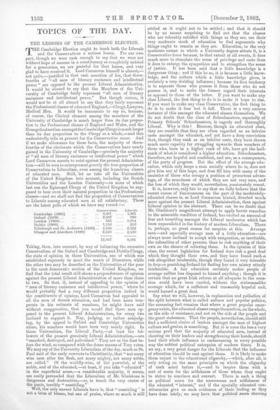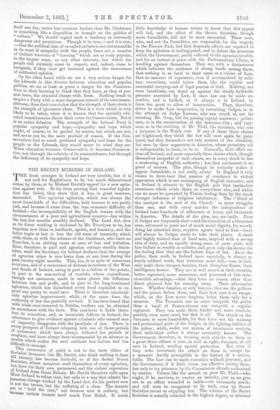TOPICS OF THE DAY.
THE LESSONS OP THE CAMBRIDGE ELECTION.
THE Cambridge Election ought to teach both the Liberals and the Conservatives a serious lesson. For our own part, though we were rash enough to say that we were not without hope of success in a constituency so completely untried for a generation, we are grateful for that lesson, and very glad to have received it. Lord Carnarvon himself is almost,— not quite,—justified in that rash assertion of his, that three- fourths of " all men of literary eminence and intellectual power" are opposed to the present Liberal Administration. It would be absurd to say that the Members of the Uni- versity of Cambridge fairly represent "all men of literary eminence and intellectual power." But though untrue, it would not be at all absurd to say that they fairly represent the Professional classes of educated England,—Clergy,Lawyers, Medical Men. It would be inaccurate to say so, because, of course, the Clerical element among the members of the University of Cambridge is much larger than its due propor- tion to the Professional classes of England and Wales, and the Evangelical section amongst the Cambridge Clergy is much larger than its due proportion to the Clergy as a whole,—and this undoubtedly tells at present for the Conservative cause. And if we make allowance for these facts, the majority of three- fourths of the electorate which the Conservatives have nearly gained in the University of Cambridge—precisely the majority of "all men of literary eminence or intellectual power" which Lord Carnarvon asserts to exist against the present Administra- tion—will be seen to misrepresent gravely the true proportion of Conservatism to Liberalism, even among the humdrum classes of educated men. Still, let us take all the Universities of the United Kingdom into account, including the Scotch Universities and the London University—in none of which last can the Episcopal Clergy of the United Kingdom be sup- posed to bear even their natural proportion to the Professional classes—and we shall not find the proportion of Conservatives to Liberals among educated men at all satisfactory. These are the latest polls of which we have any rscord t-
Cambridge (1882) ... ... Oxford (1878) .., ... London (1880)— Dublin (1868) Edinburgh and St. Andrew's (1880)... Glasgow and Aberdeen (1880) oseassestives.
3,491 2,687 535 1,156 2,418 2,520 Liberals.
1,301 999 1,014 216 2,522 2,139 12,837 8,181 Taking, then, into account, by way of balancing the excessive Conservatism of the Oxford and Cambridge and Dublin Clergy, the state of opinion in three Universities, one of which was established expressly to meet the wants of Dissenters, while the other two may be described as the Universities of the poor in the most democratic section of the United Kingdom, we find that the total result still shows a preponderance of opinion against the present Liberal Administration of more than three to two. So that, if, instead of appealing to the opinion of " men of literary eminence and intellectual power," where he would probably find a very different proportion indeed in the constituents of opinion, Lord Carnarvon had appealed to all the men of decent education, and had been more tem- perate in his estimate of numbers, he might have said without exaggeration, that you would find three men op- posed to the present Liberal Administration, for every two inclined to support it. Nay, judging, or rather misjudg- ing, by the appeal to Oxford and Cambridge Universities alone, his numbers would have been very nearly right. In those Universities, the Liberal Party,—at least the fol- lowers of the present genuinely Liberal Administration,—are "smashed, destroyed, and pulverised." They are as the dust be- fore the wind, as compared with the dense masses of Tory votes. We may say of the University Liberalism of the day, much as St. Paul said of the early converts to Christianity, that " not many wise men after the flesh, not many mighty, not many noble, are called." Of the worldly-wise, of the powerful, of the noble, and of the educated,—at least, if you take educated" in the superficial sense,—a considerable majority, it seems, are really persuaded that the Liberalism of Mr. Gladstone is dangerous and destructive,—or, to touch the very centre of the panic, terribly " unsettling."
Well, the only answer Liberals have is, that "unsettling" is not a term of blame, but one of praise, where so, much is still
settled as it ought not to be settled ; and that it should be by no means surprising to find out that the classes who are tolerably satisfied with things as they are, use their very moderate stock of education to find arguments why things ought to remain as they are. Education, to the very moderate extent to which a University degree attests it, is a Conservative force because, to that extent at all events, it does much more to stimulate the sense of privilege and caste than it does to enlarge the sympathies and to strengthen the sense of justice. It has been said that a little knowledge is a dangerous thing ; and if this be so, it is because a little know- ledge, and the culture which a little knowledge gives, is certainly a very dividing influence ; because its first tendency is to separate those who possess it from those who do not possess it, and to make the former regard their interests. as opposed to those of the latter. If you want to make any class Liberal, the first thing to do is to make it hope to rise. If you want to make any class Conservative, the first thing to do is to make it fear lest it fall. There is a very curious instance of this amongst the educated classes themselves. We do not doubt that the class of Schoolmasters, especially of Primary Schools' Schoolmasters, is eagerly and thoroughly Liberal. Why is this ? Because, though an educated class, they are sensible that they are often regarded as an inferior caste amongst the educated, and yet have a deep conviction that, though they rank as an inferior caste, they have shown much more capacity for struggling upwards than numbers of those who, born in a higher rank of life, have got the hall- mark of what is considered a higher education. Schoolmasters, therefore, are hopeful and confident, and are, as a consequence, of the party of progress. But the effect of the average edu- cation, which only keeps a man socially where he is, does not give him any of this hope, and does fill him with many of the anxieties of those who occupy a position of precarious advan- tage, of the soundness of which they are not very sure, and the loss of which they would, nevertheless, passionately resent. It is, however, only fair to say that we fully believe that the recent excess of timorousness on the part of the moderately- educated classes is, as Lord Carnarvon hinted, directed much more against the present Liberal Administration, than against Liberal opinion in the abstract. There can be no doubt that Mr. Gladstone's magnificent attempt to apply heroic remedies to the miserable condition of Ireland, has excited an amount of fear and trembling amongst the Liberal moderates which has• been unparalleled in the history of modern Liberalism. There is, perhaps, no great reason for surprise at this. Average men—and especially average men of a little education—are always more inclined to accept with resignation, as inevitable, the calamities of other persons, than to risk anything of their own on the chance of relieving them. In the opinion of this class, the recent legislation for Ireland does risk a good deal which they thought their own, and they have found sucha risk altogether intolerable, though they found it very tolerable to keep on punishing Ireland for finding her own misery utterly intolerable. A fair education certainly makes people of average calibre less disposed to hazard anything ; though it is certain that no great Irish reform at all adequate to the occa- sion could have been carried, without the statesmanlike courage which, for a sufficient and reasonably hopeful end, would hazard a great deal.
Say what we will, however, in explanation and palliation of the split between what is called culture and popular politics, the menacing fact remains that where a great popular emer- gency exists, the educated classes range themselves, on the whole, on the side of resistance, and not on the side of the people and the great statesmen. That the people, nevertheless, should still find a sufficient choice of leaders amongst the men of highest culture and genius, is something. But it is none the less a very serious peril that the majority of educated men, instead of cheering on their leaders and strengthening their hands, should lend their whole influence to embarrassing in every possible way the noblest political enterprize of modern times. It is, we say, a very great danger for the Liberals that the influence of education should be cast against them. It is likely to make them unjust to the educational oligarchy,—which, after all, is only acting on the same principles on which the oligarchy of rank acted before it,—and to inspire them with a sort of scorn for the selfishness of those whom they ought to strive to convince and convert. There is such a thing as political scorn for the narrowness and selfishness of the educated " interest," and if the specially educated con- stituencies give us such evidences of their feeling as they have done lately,' we may have that political scorn showing
itself one day, under less cautious leaders than Mr. Gladstone, in something like a disposition to trample on the politics of " culture." We should regard such a tendency as extremely dangerous and pernicious. Though it be true,—and it is true, —that the political bias of so-called culture is not statesmanlike in its want of sympathy with the people, there are a number of distinct interests of "learning" which are as truly popular, in the largest sense, as any other interests, but which the people will certainly cease to respect, and, indeed, cease to recognise, if they once get incensed against the narrowness of cultivated opinion. On the other hand, while we see a very serious danger for the Liberals in this divorce between education and popular politics, we see at least as great a danger for the Conserva- tives in their learning to think that they have, as they at pre- sent have, the educated classes with them. Nothing tends to inspire a Party with a more dangerous conceit of its own reason- ableness, than their conviction that the strength of their rivals is the strength of ignorance alone. That is a view which is very likely to be taken, when it is known that the specially edu- cated constituencies throw their votes for Conservatism. But it is an entire delusion. The strength of the Liberal Party is popular sympathy and hope,—sympathy and hope which ought, of course, to be guided by reason, but which are not, and never can be, the mere product of reason. If the Con- servatives had as much profound sympathy and hope for the people as the Liberals, they would never be what they are. When education becomes Conservative, it becomes Conserva- tive, not through the sobriety of its reasonableness, but through the deficiency of its sympathy and hope.







































 Previous page
Previous page